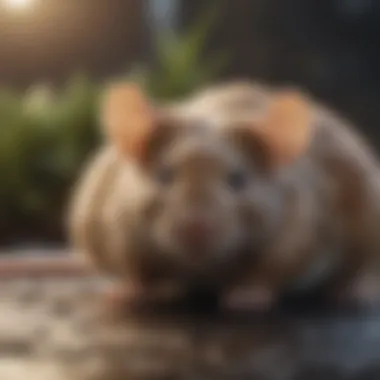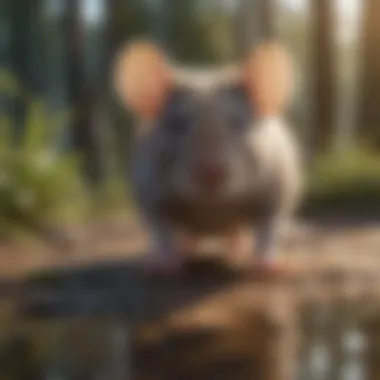Harnessing the Natural Power of Essential Oils to Keep Mice at Bay


Animal Species Profile
MICE are fascinating creatures that have adapted well to various environments, including human habitats. These small rodents typically have a body length ranging from two to four inches. Specific species may vary in color, with shades of gray, brown, or black, often blending efficiently into their surroundings. They possess a distinct pointed snout, round ears, and a long, slender tail, which aids in balance and communication within their colonies.
Mice are known to inhabit a wide range of ecosystems, from fields and forests to urban areas and agricultural spaces. Their resourcefulness in finding food and shelter allows them to thrive in different climates and geographic regions worldwide. These rodents exhibit nocturnal behaviors, preferring to forage and explore during the night, avoiding potential predators active during the day. Their diverse habitats make them a common sight for many individuals around the globe.
MICE are social creatures that live in colonies, displaying intricate communication patterns and social hierarchies. Within their groups, mice engage in grooming behaviors as a form of social bonding, establishing relationships that help ensure their survival. They communicate through a combination of vocalizations, body language cues, and pheromone signals, enabling them to coordinate activities such as foraging and protecting their nests from intruders.
Introduction
In the realm of pest control, a potent yet often overlooked solution lies in the mesmerizing world of essential oils. This article embarks on a journey to unravel the efficacy of essential oils in dissuading mice from infiltrating our living spaces. By exploring the aromatic and practical essence of these oils, we delve into a realm where nature's bounty collaborates with human ingenuity to repel unwanted intruders. The strategic integration of essential oils marks a harmonious blend of innovative pest control practices and the age-old wisdom of herbal remedies.
Understanding the Issue
Understanding the issue of mice infestations goes beyond surface-level awareness. Delving deeper into the behavioral patterns and nesting preferences of these rodents is paramount. By comprehending the nuances of what attracts mice to our homes, we can strategically devise potent solutions to deter their presence. From exploring their proclivity for warmth and shelter to their keen sense of smell guiding their movements, understanding the issue unravels a profound dimension in combating these unwanted guests.
The Rise of Natural Solutions
In an era where chemical-laden pest control methods dominate the market, the rise of natural solutions signals a transformative shift in our approach to pest management. Natural solutions, such as essential oils, offer a sustainable and environmentally friendly alternative to conventional repellents. The growing recognition of essential oils for their pest-repelling properties signifies a resurgence of ancient practices grounded in nature's inherent wisdom. By embracing natural solutions, we not only safeguard our living spaces but also contribute to the preservation of our ecosystem for generations to come.
Essential Oils That Repel Mice
In the realm of pest control, essential oils have emerged as a natural and effective repellent against mice. These aromatic oils not only offer a fragrant solution to rodent infestations but also provide a safe and eco-friendly alternative to traditional chemical-laden approaches. The significance of incorporating essential oils that repel mice lies in their dual function of keeping rodents at bay while infusing your living spaces with delightful scents. By harnessing the power of nature, you can create a harmonious environment that is unwelcoming to pests yet inviting to humans.


Peppermint Oil
Peppermint oil stands out as a potent deterrent for mice due to its strong scent that overwhelms and confuses their olfactory senses. This herbaceous oil emits a refreshing aroma that humans find invigorating but rodents find repulsive. When used strategically, peppermint oil can create an invisible barrier that discourages mice from entering your home. One key consideration when using peppermint oil is to regularly refresh the application as its potency may diminish over time, especially in high-traffic areas prone to mouse activity. By incorporating peppermint oil into your pest control regimen, you not only safeguard your home from unwanted intruders but also enjoy the added benefit of a pleasantly minty atmosphere.
Eucalyptus Oil
Eucalyptus oil, derived from the leaves of eucalyptus trees, exudes a camphoraceous scent that repels mice effectively. This essential oil acts as a natural insecticide, not only deterring pests like mice but also combating other insects that may compromise the sanctity of your living spaces. When using eucalyptus oil as a mice repellent, it's crucial to dilute it properly to avoid skin irritation and to ensure optimal diffusion of its powerful aroma. Additionally, periodic reapplication of eucalyptus oil may be necessary to maintain its efficacy, especially in regions with high humidity levels where evaporation occurs more rapidly. By harnessing the robust properties of eucalyptus oil, you can fortify your defenses against rodent intrusions and create an ambiance that breathes freshness and purity.
Tea Tree Oil
Tea tree oil, renowned for its antiseptic and antimicrobial properties, also serves as a reliable deterrent for mice due to its distinct medicinal fragrance. This essential oil not only repels rodents but also helps sanitize the environment by combating bacteria and fungi. When using tea tree oil to ward off mice, it's essential to ensure proper ventilation as its potent aroma can be overwhelming in enclosed spaces. Moreover, blending tea tree oil with carrier oils can enhance its longevity and dispersal, ensuring sustained protection against rodent incursions. By integrating tea tree oil into your pest management arsenal, you not only protect your home from mice but also promote a hygienic and sterile living environment.
Lavender Oil
Lavender oil, celebrated for its calming and soothing properties, doubles as an effective repellent against mice with its aromatic floral notes. This essential oil not only deters rodents but also imparts a sense of tranquility and relaxation to your living spaces. When utilizing lavender oil for pest control, it's important to place sachets or cotton balls infused with the oil in areas prone to mouse activity, ensuring a continuous release of its fragrant essence. Additionally, lavender oil can be blended with other oils to create custom scents that offer enhanced repellent effects against mice. By embracing the calming allure of lavender oil in your mouse deterrent strategy, you not only protect your home from unwelcome guests but also elevate the ambiance with floral elegance.
Cedarwood Oil
Cedarwood oil, derived from the aromatic wood of cedar trees, serves as a formidable shield against mice with its rich woody aroma. This essential oil not only repels rodents but also acts as a natural preservative, protecting your home from insect damage and fungal growth. When deploying cedarwood oil to deter mice, it's advisable to replenish the application periodically, especially in areas exposed to moisture or heat that may accelerate evaporation. Furthermore, combining cedarwood oil with other oils like lavender or peppermint can create synergistic blends that maximize the repellent effect on rodents. By integrating cedarwood oil into your pest control regimen, you not only fortify your defenses against mice but also imbue your surroundings with the earthy richness of ancient forests.
This comprehensive guide to essential oils that repel mice illuminates the diverse and powerful arsenal of natural solutions available for safeguarding your home against rodent intrusions. By exploring the unique characteristics and applications of peppermint, eucalyptus, tea tree, lavender, and cedarwood oils, you can craft a holistic pest control strategy that not only thwarts mice but also transforms your living spaces into aromatic sanctuaries of peace and purity.
Application Methods
In the realm of pest control, the selection of suitable application methods stands as a critical factor in ensuring the efficacy of deterring mice using essential oils. This article delves deep into the significance of application methods and their pivotal role in bolstering the pest-repelling properties of essential oils. By strategically harnessing the aromatic power of essential oils through various techniques, homeowners can establish an effective barrier against rodent infestations.


Diffusion
Among the diverse application methods, diffusion emerges as a prominent strategy in dispersing the fragrance of essential oils throughout living spaces. To effectively repel mice, diffusion involves vaporizing essential oils using diffusers, enabling the scent to permeate the air and create an environment that rodents find inhospitable. This method not only serves as a natural and non-toxic approach to pest management but also imparts a refreshing aroma to the surroundings, enhancing the overall ambiance of the home.
Cotton Balls
Utilizing cotton balls as a vehicle for essential oils presents a practical and targeted approach to deterring mice. By saturating cotton balls with potent essential oils known for their pest-repelling properties, individuals can strategically place these aromatic deterrents in areas prone to rodent activity. The absorbent nature of the cotton allows for a gradual release of the oil's aroma, effectively establishing a barrier that repels mice while integrating a subtle fragrance into the living space.
Spray Bottles
The method of using spray bottles for applying essential oils caters to a versatile and convenient means of pest control. By diluting essential oils with water and transferring the solution into spray bottles, individuals can easily dispense the aroma to targeted areas, such as entry points or potential nesting sites for mice. This method not only offers a customizable approach to pest deterrence but also enables swift application, making it an efficient solution for maintaining a rodent-free environment.
Soaked Materials
Elevating the efficacy of essential oils in deterring mice, the technique of using soaked materials infuses everyday items with pest-repelling properties. By soaking materials like cotton pads, cloths, or sachets in essential oil solutions, homeowners can create potent barriers against rodent infestations in specific locations. The gradual release of the oil's aroma from the soaked materials provides sustained protection, offering a long-lasting and aromatic defense mechanism against unwelcome rodent intrusions.
Preventing Infestations
In the realm of pest control, prevention is key. The section on Preventing Infestations is a critical component of this article on deterring mice with essential oils. By taking proactive measures to safeguard your home against rodent intrusions, you can avoid the hassle and health risks associated with infestations. It's essential to understand that prevention not only saves you from the troubles of dealing with mice but also contributes to a healthier living environment. Seal entry points, maintain cleanliness, and eliminate food sources to create a hostile environment for mice attempting to invade your space.
Sealing Entry Points
One of the primary tactics in preventing mice infestations is sealing off any potential entry points within your home. Rodents are remarkably adept at finding even the tiniest openings to gain access to your living spaces. By meticulously inspecting your walls, floors, windows, and doors for any gaps, cracks, or crevices, you can effectively block the way for these unwanted guests. Utilize materials like steel wool, copper mesh, or caulk to seal off these entry points and fortify your home's defenses against mouse intrusions.


Maintaining Cleanliness
A clean and well-maintained living space is not just visually appealing but also serves as a powerful deterrent against mice and other pests. In this section, we highlight the significance of cleanliness in preventing infestations. Rodents are attracted to clutter, food remnants, and unkempt areas that offer hiding spots and potential food sources. By regularly cleaning, decluttering, and organizing your home, you create an environment that is less hospitable to mice, reducing the likelihood of infestations. Keep floors swept, surfaces wiped, and garbage tightly sealed to eliminate any potential attractions for rodents.
Eliminating Food Sources
Food is a primary motivator for mice to enter homes and nest in cozy corners. Therefore, eliminating food sources is a crucial aspect of preventing infestations. In this section, we delve into the importance of proper food storage, waste management, and eliminating accessible food for rodents. Store pantry items in airtight containers, dispose of garbage promptly, and avoid leaving pet food out overnight. By removing these food incentives, you not only discourage mice from entering but also contribute to a healthier and pest-free home environment.
Safety Considerations
Safety considerations form a paramount aspect of using essential oils as a repellent against mice. Ensuring the safe application and storage of these potent oils is crucial to prevent any adverse effects on pets, children, or the environment. Proper handling and dilution guidelines should always be followed to mitigate potential risks. Understanding the toxicity levels of each oil and its impact on different species is fundamental in creating a safe pest-repellent environment within your home. Seeking advice from vetted sources or professionals in aromatherapy can provide valuable insights into the best practices for using essential oils safely around pets and children.
Pets and Essential Oils
When it comes to pets and essential oils, cautiousness is key. Certain essential oils can be harmful to pets if ingested or applied directly to their fur. Cats, in particular, are sensitive to essential oils like tea tree oil and eucalyptus oil. One should always avoid using essential oils around pets without proper guidance. It is essential to keep oils stored securely and out of reach of curious pets. Understanding the specific effects of each essential oil on different types of pets is vital in ensuring a safe and pet-friendly environment within your home.
Children and Essential Oils
Involving children in the use of essential oils requires extra care and attention. Children have delicate skin and respiratory systems, making them more susceptible to the effects of potent oils. It's crucial to dilute essential oils significantly when using them around children. Avoiding direct contact with the skin and ensuring proper ventilation during oil diffusion are essential safety measures. Educating children about the proper use and handling of essential oils can help instill a sense of responsibility and awareness. Always opt for child-safe oils and consult with healthcare professionals before incorporating essential oils into your children's environment.
Conclusion
In the realm of pest control, the importance of natural solutions cannot be overstated. This article on keeping mice away through the use of essential oils serves as a testament to the power of nature-based remedies. By embracing natural solutions, one not only addresses the issue of rodent infestation but also contributes to a safer and more environmentally-friendly living space. The utilization of essential oils like peppermint, eucalyptus, tea tree, lavender, and cedarwood showcases the efficacy of botanical extracts in deterring pests without the need for harmful chemicals. Embracing these natural alternatives is not only beneficial for the home environment but also for the well-being of household members and pets.
Embracing Natural Solutions
Embracing the concept of natural solutions in pest control signifies a shift towards sustainable and non-toxic methods of dealing with infestations. Essential oils stand out as potent agents in repelling mice without posing risks to human health or the ecosystem. By leveraging the natural scents of oils like peppermint and eucalyptus, homeowners can create inhospitable environments for rodents while enjoying the added benefits of a naturally fragrant home. The versatility of essential oils extends beyond mere pest control, offering a holistic approach to cultivating a harmonious living space that promotes well-being and environmental consciousness.
Creating a Safe and Fragrant Environment
Creating a safe and fragrant environment goes hand in hand with the use of essential oils in pest management. Beyond their pest-repelling properties, essential oils contribute to the overall ambiance of a space, imbuing it with soothing fragrances and promoting relaxation. The process of using essential oils to deter mice not only serves a practical purpose but also enhances the sensory experience within the home. Maintaining a clean and fragrant environment through the strategic application of oils not only keeps pests at bay but also elevates the living experience for occupants, fostering a sense of tranquility and well-being.





